Carré ceramics
A history, values, a know-how
An exemplary path
Five generations of company directors are the backbone of the Carré establishments today. Marketing men before their time, they were able to foresee and anticipate the evolution of the markets and above all to adapt to them. In a profession that they knew better than any other, generation after generation, they imposed on their own company the radical transformations that were essential to the evolution they foresaw.

In 1888, Ernest Carré, the son of a manufacturer from Chaumont-sur-Loire, decided to settle in Paris and took the gamble of developing the trade in building lime and ceramic tiles, earthenware and terracotta. Later, with his son Gustave, he added refractory products which were in great demand in the building and industrial sectors.
1925 : the Roaring Twenties, the great wave of Art Deco. The company really came into its own thanks to the intuition of Roger Carré, who foresaw the tremendous development of home decoration. The company set up shop in a new and booming market : decorated tiles and traditional hand-made tiles. Beauvais tiles, Auneuil tiles, Burgundy cobblestones or Provencal floor tiles, glazed earthenware, borders, friezes…
From 1955 onwards, Jean-Michel Carré gradually abandoned the production of standard products and decided to specialise in the manufacture of top-of-the-range and made-to-measure products, which were to become the spearhead and brand image of the Carré company.
Today, faced with the internationalisation of markets, Carré has chosen to form an alliance with Les Jolies Céramiques S.A. group, a French industrial company specialising in the manufacture of top-of-the-range tiles (Émaux de Briare, Aurum…), which ensures the company’s durability and investment capacity, and enables it to meet the strategic challenges of the future as it did in the past.
Quality and creativity
Since the beginning, Carré has pursued the consistent approach that ensures its success : quality, creativity and openness to the world.
A rigorous technique allows us to offer beautiful and solid products. A high-performance ceramic research laboratory constantly improves the strength, reliability and quality of the products. Creativity is the imperative response to customer attention. Over the years, one of the major assets for success and openness has been the close cultural collaboration with avant-garde decorators, renowned designers and ceramists, a melting pot which naturally allowed for the regular renewal of styles. For almost a century, Jean Royère and Jean Bourdet, Roger Capron, Jacques Luzeau and Jean Piantanida, and more recently Hilton Mc Connico and Andrée Putman, have all contributed to the reputation of Carré.

Pavillon de la céramique, 1937

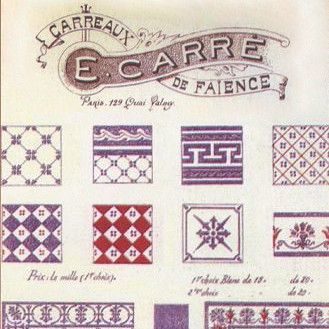
1890


F.Levy, 1930
The know-how
Established since 1888 on the Quai de Valmy in Paris, on the banks of the Canal Saint-Martin, opposite the famous Hôtel du Nord, the company started its activity as a wholesaler in building materials with Ernest Carré. From 1937 onwards, avant-garde decorators such as Jean Royère and Louis Sognot called on its services. Specialists in the decorative arts, they led the company towards the creation of high quality ceramic products. In 1952, Jean-Michel Carré caught the tile virus. He bought out the factories that were working for him and thus mastered the creation, manufacture and marketing of top-of-the-range decorated tiles.
Carré today remains a matter for professionals. Developed on the drawing board, imagined, invented, perfected and painted by hand in a ceramic laboratory, the tiles are manufactured in Orriule, in the Béarn region. Hidden away in a hilly landscape, green as far as the eye can see, it is here that one discovers the “secrets” of manufacture in the calm of the countryside. The terracotta tradition existed here. The workshops were built on the site of an old pottery.
The clay, extracted locally but also in the Allier and in the Charente, is cleaned of its impurities; crushed and fired, it becomes chamotte; diluted and filtered, it becomes barbotine; spun into a loaf, it is ready to be transformed into a flat ribbon and die-cut into its final tile shape; placed on a shelf by an expert hand, the soft paste dries in a kiln.
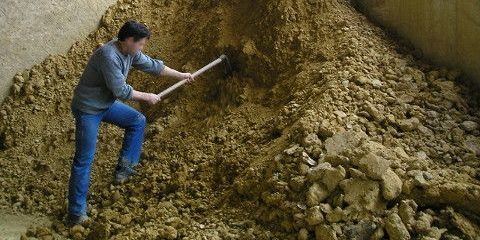
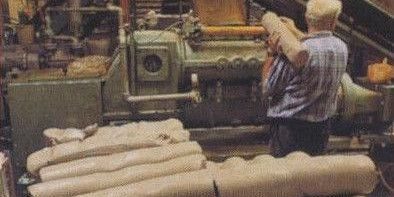
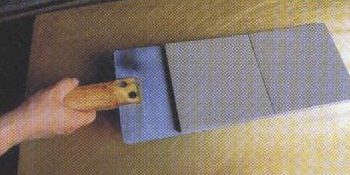
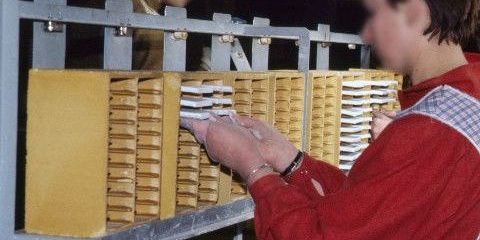
A first firing in a tunnel kiln lined with ceramic fibres gives it its biscuit appearance. The tiles are then transported and slowly glazed: a fine white rain falling from a bell is propelled by a turbine, or applied with a spray gun with an expert gesture. The second firing is spread out over twenty-four hours. Here, the paste will harden thoroughly. Decorated by hand with brushes, stamps, stencils or silk-screening, they undergo a final firing. The fire makes the colours blaze; the glazing adds a shine, a lightness, a translucence that is quite marvellous… it is a state of grace.
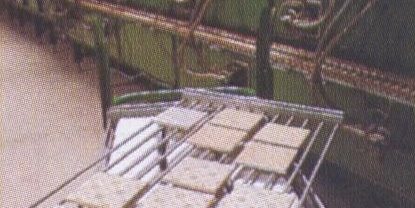
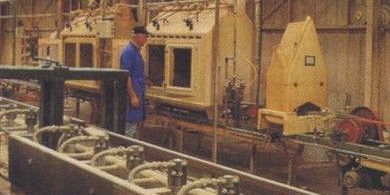
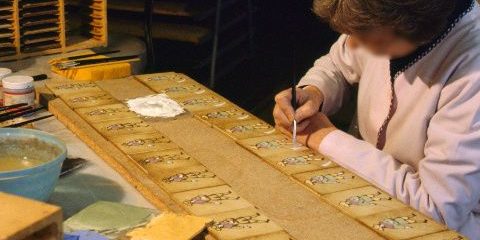
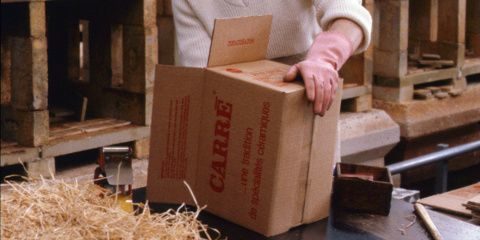
overwhelming mechanization has not invaded the manufacturing process."

Shop : Quai de Valmy
- 91, quai de Valmy - 75010 Paris
- (+33)1 46 07 82 11
- (+33)1 46 07 37 61
Shop : Rue du Bac
- 7, rue du Bac - 75007 Paris
- (+33)1 42 61 16 41
- (+33)1 42 61 53 31
Head Office & Commercial Department
- Carré establishments
- 91, quai de Valmy - 75010 Paris
- (+33)1 46 07 82 11
- (+33)1 46 07 37 61